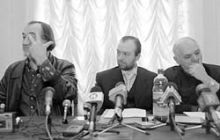A press conference held by the film crew of the controversial, Prayer for Hetman Mazepa submitted to the 52nd Berlin festival was marked by a crowded and somewhat tense atmosphere. The Kyiv media were all in attendance and the podium, adorned with Berlinale posters, was equally well represented: director Yury Illienko, lead and Ukrainian star Bohdan Stupka, production designer Serhiy Yakutovych, producer Ihor Didkovsky, and Hanna Chmil, deputy state secretary of the Ministry of Culture and the Arts that had played a major role in carrying out the project.
Yury Illienko presided at the press conference, keeping it in an aggressively assertive vein. He attributed the picture’s failure to vie in the contest to a belated preview by the festival’s selection committee. After that, obviously by way of evidence of international acclaim, he produced the Berlin catalog with the Prayer for Hetman Mazepa figuring on the hors concours page, along with the new productions by Istvan Szabo, Wim Wenders, Chang Imou, and Robert Altman. Off and on, with and without cause, he lashed out at the ill-wishing ICTV channel. As for his picture, Mr. Illienko said one of the biggest problems was Mazepa’s enigmatically elusive character, which is known to have been interpreted in at least three different ways in world literature – as a traitor, rebel, and heroic lover. All things considered, Yury Herasymovych concentrated on the latter. He believes, however, that Bohdan Stupka’s performance still leaves an elusive impression.
This touch of the infernal was enhanced by a Greek Catholic priest assuring that the much- advertised public prayers for Mazepa are indeed underway in the churches of his confession, and that the Orthodox Uniate Church has never supported the hetman’s anathema “in full measure.”
Media people, however, showed more interest in the purely secular aspects of the production. When asked by The Day how well the Illienko project had paid off after its massive pecuniary injections, Hanna Chmil responded by lashing out at the press for groundlessly accusing the film of bleeding the cultural budget. She declared that there were enough appropriations left for other productions (38 were completed last year, she added, and everyone more or less familiar with Ukrainian filmmaking listened to that in open-mouthed amazement), and this was considering that the ministry did not receive seven million hryvnias due it.
Another sensitive issue concerned the movie’s premiere date in Ukraine, expected in September, seven months later. This made the conference participants very loquacious, offering quite an assortment of most convincing reasons. First, the picture was a spectacular international success, already requested by eight film festivals, meaning that if it were shown in Ukraine now the effect would be dampened, because people abroad like exclusive shows. Second, a run in Ukraine required special arrangements, as very few movie theaters have Dolby equipment and the film must make money, because the project involves private investment. Finally, the Ukrainian public was simply unprepared to digest a controversial and elusive Mazepa, so a promotional campaign was necessary which, in turn, called for putting together a team of analysts to carry out a number of appropriate programs. UT-1 will run a special program regularly telling about Ivan Mazepa and his epoch. Later, after the audience is prepared, the long-awaited movie will be shown.
Turning to the numerically small part of the audience asking and taping questions during the press conference, Yury Illienko, telling about the massacre scene in Baturyn, noted casually, “I needed 15,000 dead bodies, but where would I get that many? We don’t have that many journalists.” And the relations between the film crew and critics promise to be anything but simple. Illienko & Co. take an adamant stand, akin to that of a deity descending upon this sinful earth to make things right. In fact, Mr. Illienko said that “the Prayer is a special, new filmmaking genre. There is no way you can condemn a prayer!”
From the Editors: Despite Yury Illienko’s self-assumed being above judgment, we believe that the Prayer cannot remain the authors’ private affair, if only because it is partially a government contract and because it implies a patriotic message. The question is what kind of message this is. The media people present could not receive an answer to this, because the organizers did not deem it expedient to stage a show for the press. Indeed, why bother, considering that the media was offered an extensive press conference extolling the “first purely Ukrainian project represented at the Berlinale,” assuring the journalists that this was an epochal event. Any opinions to the contrary could always be cut short by pointing out that you have not seen the movie, so how can you say differently. Well, of course you are free to say what you think, but only in general terms. Somehow it is embarrassing to remind one that such “security arrangements” can only humiliate a gifted filmmaker of Illienko’s caliber. We also believe that Ukrainian audiences are more prepared to receive and understand the motion picture, and even more so the image of Ivan Mazepa, than we are being led to believe (or maybe the authors are persuading themselves). Our audiences are quite friendly, more than the foreign festival ones on which Mr. Illienko seems to be staking so much. Also, it is strange to have such a patriotic film as Prayer for Hetman Mazepa and make our public wait another half year, having to make do with only US productions.








